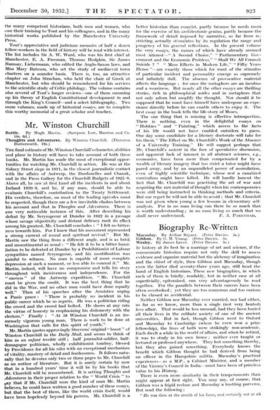Mr. Winston Churchill THE final estimate of Mr. Winston Churchill's
character, abilities and place in history will have to take account of both these boOks. Mr. Martin has made the most of exceptional oppor-
tunities for watching Mr. Churchill in action. He was at the Sidney Street siege in 1911, in the closest journalistic contact with the affairs of Antwerp, the Dardanelles and Chanak, and in the Press Gallery for the Churchill Budgets of 1925-9. Above all, he saw at first hand all the incidents in and about Ireland 1920-3, and he, if any man, should be able to evaluate Churchill's contribution to the Treaty Settlement. His verdicts, therefore, on most of the leading episodes must be respected, though there are a few inevitable clashes between his account and that in Thoughts and Adventures. There is one very noticeable instance of this. After describing his defeat by Mr. Scrymgeour at Dundee in 1922 in a passage whose savage objectivity and distant delicacy rank its effect among his greatest, Mr. Churchill concludes : " I felt no bitter- ness towards him. For I knew that his movement represented a strong current of moral and spiritual revival." But Mr.
Martin saw the thing from a different angle, and is as brisk and unsentimental as usual : " He felt it to be a bitter humi- liation to be defeated at Dundee by a Prohibitionist of Labour sympathies named Scrymgeour, and his mortification was painful to witness. No man is capable of more complete depression at such a moment, or less able to conceal it." Mr. Martin, indeed, will have no compromise and tells his story throughout with incisiveness and independence. For the " success " of the Antwerp expedition, " Mr. Churchill must be given the credit. It was the best thing that he did in the War, and no other man could have done equally well." Then of his speeches after the Armistice urging a Punic peace : " There is probably no incideixt in his public career which he so regrets. He was a politician riding the crowd and the crowd had bolted. He shows at any rate the virtue of honesty in emphasizing his dishonesty with the electors." Finally : " At 58 Winston Churchill is an im- mensely vigorous young man. There is work to be done at Washington that calls for this spirit of youth." Mr. Martin quotes approvingly Steevens' original " boost " of Winston Churchill in the Daily Mail, and seems to think of him as an enfant terrible still ; half journalist-soldier, half- demagogue politician, wholly exhibitionist tomboy, blessed by Providence for all his roles with an exceptional mechanism of vitality, mastery of detail and fearlessness. It follows natu-
rally that he devotes only two or three pages to Mr. Churchill as an author of literature. But it is surely certain by now
that in a hundred years' time it will be by his books that Mr. Churchill will be remembered. It is setting Thoughts and
Adventures in their proper relation to the " World Crisis " to say that if Mr. Churchill were the kind of man Mr. Martin
believes, he could have written a good number of these essays, but that the best of them, like the world crisis itself, would
have been hopelessly beyond his powers. Mr. Churchill, is a-
better historian than essayist, partly because he needs room for the exercise of his architectonic genius, partly because the framework of detail imposed by narrative, so far from re- stricting, actually stimulates by its regulation the range and pungency of his general reflections. In the present volume the very essays, the names of which have already aroused most interest—" A Second Choice," " Parliamentary Gov- ernment and the Economic Problem," " Shall We All Commit Suicide ? " Mass Effects in Modern Life," " Fifty Years Hence "—are exactly those which for want of the stimulus of particular incident and personality emerge as supremely and infinitely dull. The absence of provocative material affects the language ; for once the metaphors are an incubus and a weariness. But nearly all the other essays are thrilling stories, rich in philosophical asides and in metaphors that not only adorn but amplify the thought. Nor should it be supposed that he must have himself have undergone an expe- rience directly before he can enable others to enjoy it. The best essay in the book tells the life-story of Moses.
The one thing that is missing is effective introspection. There is nothing, even in the delightful essays on " Hobbies " and " Painting," which access to the facts of his life would not have enabled outsiders to guess. One day some candidate for a literary doctorate will take for his thesis " The Effect on Mr. Churchill's Work of the Absence. of a University Training." He will suggest perhaps that Mr. Churchill's naiveté in the face of speculative discussion, and apparent lack of interest in all abstract sciences, e.g., economics, have been more than compensated for by a wealth of literary imagery that too strict a tutor might have pared away, and by an unparalleled power of assimilation, even of highly scientific technique, whose zest a canalized• curriculum might have killed. He will hardly lament the fact that Mr. Churchill was practising the art of war and acquiring the raw material of thought when his contemporaries were still being 'instructed in thinking methods and criteria. But one regret he will not be able to avoid : that Mr. Churchill was not given when young a few lessons in elementary self-. analysis. For in no man living can there be so much that is worth understanding ; in no man living so much that we






























 Previous page
Previous page